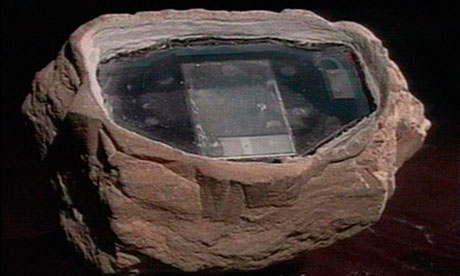Britain was behind a plot to spy on Russians with a device hidden in a fake plastic rock, a former key UK government official has admitted.
Jonathan Powell, former chief of staff to prime minister Tony Blair, admitted in a BBC documentary that allegations made by the Russians in 2006 - dismissed at the time - were in fact true.
"The spy rock was embarrassing," he said in the BBC2 documentary series, Putin, Russia and the West. "They had us bang to rights. Clearly they had known about it for some time and had been saving it up for a political purpose."
A diplomatic row was sparked six years ago after Russian state television broadcast a film claiming British agents had hidden a sophisticated transmitter inside a fake rock left on a Moscow street. It accused embassy officials of allegedly downloading classified data from the transmitter using palm-top computers.
 The TV report showed a video of a man slowing his pace and glancing down at the rock before walking quickly away; another man was shown kicking the rock, while another walked by and picked it up. The Russian security service, the FSB, broadcast X-rays of a hollowed-out rock filled with circuitry and accused four British men and one Russian of using it to download information.
The TV report showed a video of a man slowing his pace and glancing down at the rock before walking quickly away; another man was shown kicking the rock, while another walked by and picked it up. The Russian security service, the FSB, broadcast X-rays of a hollowed-out rock filled with circuitry and accused four British men and one Russian of using it to download information.The FSB alleged that British security services were making secret payments to pro-democracy and human rights groups. Soon after the incident, then President Vladimir Putin forced the closure of many non-governmental organisations (NGOs) after introducing a law restricting them from receiving funding from foreign governments.
"We have seen attempts by the secret services to make use of NGOs. NGOs have been financed through secret service channels. No one can deny that this money stinks," said Putin. "This law has been adopted to stop foreign powers interfering in the internal affairs of the Russian Federation."
Britain's ambassador in Moscow at the time, Tony Brenton, denied the government had been involved in covert activities.
"All of our activities with the NGOs were completely above board," he said. "They were on our website, the sums of money, the projects. All of that was completely public."
The revelation comes at a sensitive time, with Putin renewing attacks on human rights and opposition activists as hostility to his premiership grows. He has repeatedly accused the west, namely the US, of using activists to plot to bring regime change to Russia.
"Putin, as a former spy and KGB agent, is trying to discredit us with the only methods he knows," said Lev Ponomaryov, a prominent human rights activist. "For any thinking person this rock meant nothing – it was simply a provocation, a cheap trick used by a former KGB agent."At the time Blair attempted to play down the allegations, and the Foreign Office denied any irregular relations with Russian NGOs. When asked about the incident, Blair smiled as he told journalists: "I think the less said about that, the better."





